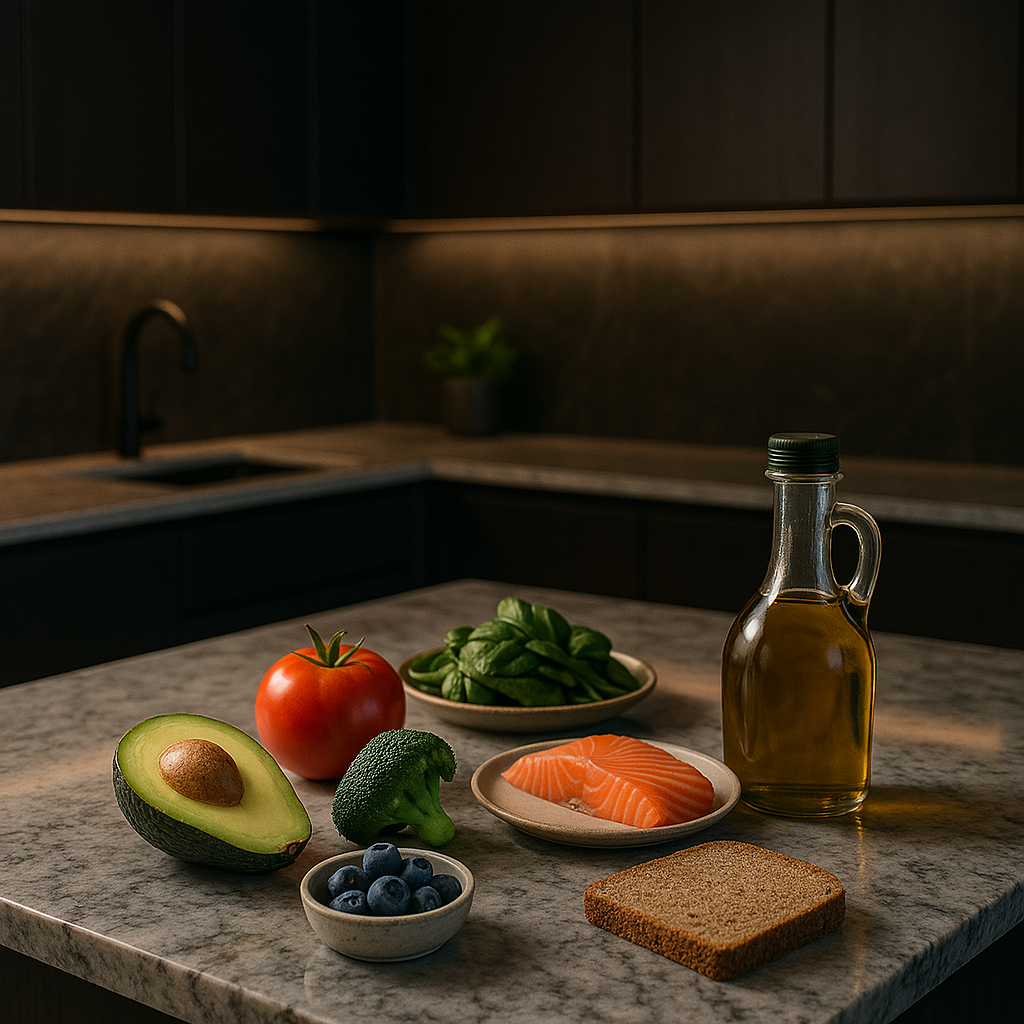
What if adding a few simple foods to your diet could help you live longer? Studies reveal that genetics influence only about 20% of our lifespan, while lifestyle choices like diet and exercise account for the other 80%. That means the food you eat has the potential to extend your life and improve how well you live it.
This article is for anyone who wants realistic, science-backed tips on using food to stay healthy and age gracefully. We’ll walk through the science of diet and longevity, highlight food groups that can help you age well, show which foods to limit or avoid, and share simple tips for starting a longevity-focused eating plan today.
By the end, you’ll have plenty of practical strategies to make eating for a longer life both effective and enjoyable.
Healthy eating starts with healthy cooking tools—Discover which non-toxic cookware we trust for healthier cooking.
The Science Behind Diet and Longevity
Your diet is a major factor in how long and how well you live. According to research published in The Lancet, poor diets cause one in five deaths globally, often from chronic illnesses like heart disease, stroke, and diabetes. Meanwhile, healthier eating habits not only reduce the chances of these diseases but also help extend your “healthspan,” which is the period of life you spend feeling healthy and active.
Here’s how food impacts your longevity:
- Lowers Disease Risk: Whole, unprocessed foods protect your heart, stabilize blood sugar, and improve cholesterol levels.
- Controls Chronic Inflammation: Antioxidant-rich foods like berries or leafy greens help keep inflammation in check, lowering risks for diseases like Alzheimer’s.
- Slows Aging at the Cellular Level: Specific nutrients affect telomeres, which are protective ends of DNA strands. Healthy eating helps keep these telomeres intact.
The main point? Your food choices today can influence how well your mind and body age in the future.
Key Food Groups for a Longer Life
Eating well for longevity isn’t about overly restricting yourself. Instead, focus on these nutrient-packed food groups for better health and increased energy.
1. Whole Plant Foods
Foods like fruits, vegetables, beans, nuts, and whole grains belong at the center of your meals. These are loaded with fiber, vitamins, and antioxidants that repair your body and lower harmful inflammation.
- Why it matters: A study shows eating five servings of fruits and vegetables daily reduces the risk of death by 13%. You can read more findings here.
- Quick tip: Add fruit to your breakfast oatmeal, eat a side salad with lunch, and roast colorful veggies for dinner.
2. Healthy Fats
Not all fats are bad. Opt for healthier plant-based fats, like those found in olive oil, nuts, seeds, and avocados. Fatty fish, like salmon, is another great choice, as it’s packed with omega-3s that boost brain and heart health.
- Why it matters: Replacing butter with healthy fats like olive oil reduces overall risk of death by 19%, according to data found here.
- Quick tip: Drizzle some olive oil on your salad or snack on a handful of almonds.
3. Lean and Plant-Based Proteins
Beans, lentils, tofu, chicken, and fish are excellent protein choices. Eating too much red or processed meat, on the other hand, has been linked to heart issues and certain cancers.
- Why it matters: Studies show regularly eating processed meats raises mortality risk by 23%. For more details, see the study findings here.
- Quick tip: Try swapping a meat-based meal each week for a plant-based option like lentil soup or a veggie stir-fry.
Foods to Limit or Avoid for Longevity
Some foods can harm your health if eaten regularly. Reducing your intake of these can protect your long-term vitality.
1. Ultra-Processed Foods
Packaged snacks, sugary drinks, and junk foods may taste good, but they’re low in nutrients and linked to higher risks of obesity and chronic illnesses.
- Why it matters: Eating extra servings of ultra-processed foods increases mortality risk by 2% per serving. See the published findings here.
- Quick swap: Choose plain oatmeal with fresh fruit over sugary cereals.
2. Added Sugars
Excess sugar, especially in drinks and processed foods, can lead to weight gain, diabetes, and heart disease.
- Quick tip: Stick to water, herbal tea, or plain coffee instead of sodas or fancy coffees loaded with syrups.
3. Red and Processed Meats
Things like bacon, sausage, and deli meats are okay as a rare treat, but regular consumption increases the risk of heart disease and cancer.
- Quick tip: Treat meat as a side dish, not the star of your meal. Serve it alongside a plate that’s mostly veggies and whole grains.
Practical Tips for a Longevity Diet
Switching to a healthier eating plan may feel overwhelming, but small, consistent steps make a big difference.
1. Prep Meals Ahead
Busy days often lead to less healthy choices. Planning and prepping your meals can help you stay on track.
- Example: Cook a big veggie stew or make overnight oats so breakfast is ready each morning.
2. Use the Plate Method
To keep your meals balanced, divide your plate into three sections:
- 50% fruits or veggies
- 25% lean protein
- 25% whole grains
3. Choose Smart Snacks
Avoid processed snack options by keeping healthy items, like sliced veggies, nuts, or plain Greek yogurt, easily available.
4. Try Blue Zone-Inspired Foods
Blue Zones are areas where people live longer than average, and their diets are mainly plant-based. Incorporate their favorites like bean stews, stir-fries, or leafy green salads drizzled with olive oil.
5. Don’t Overeat
Okinawans who live exceptionally long lives follow the “80% full” rule. Stop eating when you feel satisfied without being stuffed.
6. Stay Hydrated
Drinking water keeps you sharp and energetic. Try to replace soda and juice with tea, water, or black coffee throughout your day.
Mindful Eating for a Vibrant Life
Every bite counts when it comes to supporting long-term health. Choosing nutrient-rich, whole foods and avoiding processed options helps you stay active and feel great as you age.
Remember, consistency is more important than perfection. Start small, like swapping sodas for water or adding more vegetables to your meals this week. Over time, these little changes lead to big improvements in both health and energy.
Your future self will thank you! Start incorporating some of these easy tips today, and celebrate every healthy choice you make along the way.



